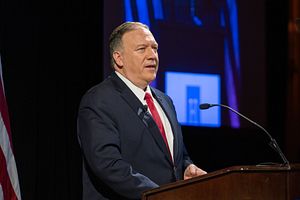By Ankit Panda
On Friday, Politico reported that U.S. Secretary of State Mike Pompeo has been “quietly” planning a trip to meet senior Chinese officials in Hawaii. The trip, if it happens, would be the highest-level U.S.-China bilateral meeting since the signing of the “Phase One” trade deal back in January. It would certainly mark the most important such bilateral meeting after both sides traded accusations after the rapid spread of COVID-19 around the world.
It’s unclear what exactly Pompeo’s objective with such a trip might be. The U.S. secretary of state has drawn Chinese ire for personally raising the profile of unsubstantiated theories that the SARS-CoV-2 virus that causes COVID-19 was released as a result of a biosafety failure at a Chinese lab in Wuhan. Pompeo repeated this idea shortly after the U.S. Office of the Director of National Intelligence released a rare statement that the “[U.S.] Intelligence Community also concurs with the wide scientific consensus that the COVID-19 virus was not manmade or genetically modified.”
Politico did note that Pompeo’s travel plans were not finalized as of the time of the report. There’s a good chance that there may not end up being a Hawaii meeting. Yang Jiechi, the director of the Central Affairs Commission Office of the Communist Party of China’s Central Committee — effectively, China’s most senior official handling foreign affairs — is most likely to be Pompeo’s interlocutor, according to the South China Morning Post.
If Yang were to agree to such a meeting in Hawaii, it would be an ideal setting for the two sides to seek some form of détente — at least over issues pertaining to the origins of the pandemic. The United States and China have much still to disagree about, including trade, 5G, Hong Kong, and intellectual property. Given the state of ties, it’s unlikely that such a high-profile meeting would take place without a specific agenda.
Given that Pompeo appears to be taking the lead, it’s unlikely that trade alone would be the headline agenda item. Robert Lighthizer, the U.S. trade representative, would ostensibly take the lead on that. Separately, Hong Kong does appear to be among the top issues on the U.S. diplomatic agenda with allies and partners, but it’s difficult to imagine any Chinese official agreeing to discuss this in a bilateral setting. China has pushed back on U.S. and other statements on its National People’s Congress’ decision last month to move ahead to draft a national security law by saying that Hong Kong’s fate is an “internal matter.”
The meeting may be officially confirmed this week, but it’s far from clear that it’ll materialize — or that even if it does, it’ll help reduce tensions in the U.S.-China relationship.

No comments:
Post a Comment